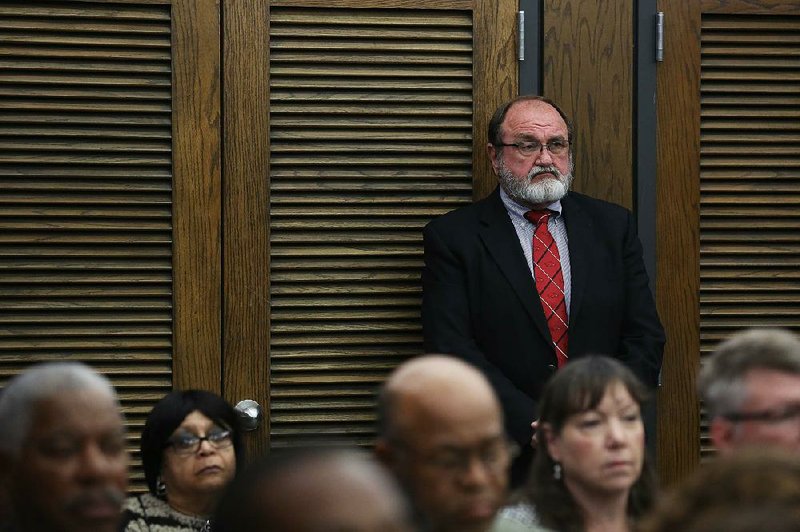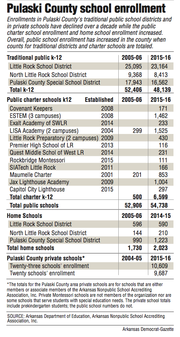The Pulaski County Special and Helena-West Helena school districts, under state control since 2011 for financial mismanagement and overspending, on Thursday were relieved of their fiscal-distress labels and will be returned to the direction of locally elected school boards by year’s end.
RELATED ARTICLE
http://www.arkansas…">Charter expansions get 2nd look
Acting on the recommendation of the Arkansas Department of Education, the state Education Board voted unanimously to allow the districts to operate under local control once school board members for the two districts are elected and trained.
School elections are in September. But under a new state law, districts can opt to hold their elections in the November general election.
Community members in the Helena-West Helena district will not only regain control of the nearly 1,500-student system, but — as a result of a Education Board’s actions Thursday — can manage the district with some flexibility in regard to state laws and rules. The Education Board approved a long list of waivers of state laws and accreditation standards for the school system.
The 17,000-student Pulaski County Special and the Helena-West Helena districts were taken over by the state in June 2011 on the basis of audit findings of mismanagement and declining balances that put the districts at risk of illegal deficit spending. The districts’ school boards were dissolved, and their superintendents were replaced with state-appointed leaders who answered to the Arkansas education commissioner.
Education Department staff members reported to the Education Board earlier this month that the two districts have corrected their financial problems and completed all the provisions of their fiscal-distress improvement plans.
Both districts have in recent years cut dozens of employee positions. The Pulaski County Special district reduced the length of the teacher work year and cut employee benefits that had gone beyond state minimums. Both districts have closed some of their campuses.
The Pulaski County Special district, which has a current budget of $180.7 million, is projected to end the school year with close to $19 million in unrestricted reserves, according to Education Department documents. Helena-West Helena has a budget of about $11.8 million this year. The district started this school year with $6.23 million in unrestricted reserve funds and is projected to end the year with almost $6.3 million.
Both districts continue to have problems, however.
The Pulaski County Special district remains under federal court supervision for its desegregation efforts in five areas of operation, including facilities, student achievement and student discipline. Also, the district will separate from the new Jacksonville/North Pulaski school district on July 1, which will mean the loss of 4,000 students, nearly 500 employees, nine campuses and as much as $40 million in revenue. The district also is facing the loss of more than $20 million a year in state desegregation aid after the 2017-18 school year.
“This recommendation certainly doesn’t diminish the challenges Pulaski County faces concerning the detachment and the continuing desegregation obligations,” Education Commissioner Johnny Key told the Education Board, but he said the district’s success in handling its past financial problems warranted it being released from state control.
Jerry Guess, superintendent of the district, told the Education Board that he was proud of the district’s financial situation and of the 2014 settlement in a long-running federal school desegregation lawsuit. But, he said, the district must continue to make progress on the desegregation matters and be able to offset the detachment of the Jacksonville/North Pulaski district.
Education Board member Jay Barth of Little Rock said the district is complicated geographically, demographically and historically. He thanked Guess for his candor in dealing with the state Education Board.
“We know this is not over, and this is perhaps the biggest challenge — the return to true local control,” Barth said.
Education Board member Diane Zook of Melbourne asked whether there were any assurances that the new school boards would retain Guess and Helena-West Helena Superintendent John Hoy.
Key said there are no guarantees because the employment decisions will be the purview of the elected boards.
In the Pulaski County Special and Helena-West Helena districts, seven-member state-appointed Community Advisory Boards will continue to operate until elected school boards are in place.
In Helena-West Helena, Community Advisory Board Chairman Andrew Bagley announced that all seven members of that advisory board intend to run for the School Board in a November election.
Education Board Chairman Toyce Newton of Crossett noted that Helena-West Helena has been under state control on two occasions and she hoped lessons have been learned and mistakes will not be repeated.
Key said that while the Helena-West Helena district doesn’t have the same kinds of problems as Pulaski County Special, the challenges in the east Arkansas system are significant. He said it is imperative that the community support and work with the district.
Bagley told the state board that the Helena-West Helena community is ready to regain control of the district.
“We never want the scarlet ‘F’ of fiscal distress placed on our foreheads again,” he said, adding that the label was embarrassing but that the district is now better for it.
Barth noted that Central High School in the Helena-West Helena district is labeled by the state as academically distressed because fewer than half of its students scored at proficient levels on state math and literacy tests in the past three years.
At Barth’s urging the state board’s committee on academic distress will review the work at the high school and report back to the full state board in June. Barth said the report is intended to give the Education Board assurances that the district is on the right path as it moves into local control.
In anticipation of being released from fiscal-distress status, Hoy and the Helena-West Helena district petitioned the Education Board on Thursday for waivers from state laws and rules that typically dictate the operation of a public school system.
Act 1240 of 2015 allows a school district to petition the Education Board for the same waivers that are granted to an independently operated open-enrollment charter school that draws students from the traditional district.
The Helena-West Helena district asked for all of the same waivers given to KIPP Delta Charter Schools, which competes with the district for students.
The requested waivers pertain to teacher and superintendent licensure; the removal of teachers; minimum salary schedules; faculty planning time; duty-free lunches for faculty members; the cap on the number of students in a class or the number of students a teacher has per day; the student grading scale; the opening and closing dates for the school year; school board meeting requirements; and the provision of student services including library/media, counseling, gifted education and alternative education.
Waivers that were granted are good for five years.
Bagley told the board that the rules of the game need to be the same for the traditional school district and the charter school.
“You can’t expect us to do all these things that the various rules and laws require, and compete with somebody who doesn’t have to do it,” he said. “We are being asked to shoot a three-point shot every day, while KIPP is getting to shoot a layup.”
Hoy told the Education Board that the district would not need and did not intend to use all of the requested waivers, but it would be most efficient to request all of the waivers at one time. Repeatedly, Hoy and other district leaders said in the petition for waivers that they want the “flexibility if needed” that particular waivers of state laws and school accreditation standards would provide.
Hoy said the district is working to improve student achievement and college preparation for students. He said that is to be done by emulating the successes of other schools — such as the KIPP charter schools — and build on those successes to make a program the district’s own.
The Helena-West Helena district is planning to adopt an “academy” structure that is “based on the same or similar philosophies, methodologies, procedures and practices as KIPP Delta Charter Schools.
“It is our intent to implement these academies K-12 beginning in the 2016-17 school year and to expand to the high school beginning in the 2017-18 school year,” Hoy said.
The Education B oard stopped short of approving all of the requested waivers. It did not grant waivers of the state’s Teacher Fair Dismissal Act, or requirements that new superintendents be provided mentoring, or requirements for gifted and talented education.
Bagley argued to the Education Board that a waiver from the Teacher Fair Dismissal Act would ease the firing of ineffective teachers, but he said the district intended to provide every employee with a hearing as required by the state’s Public School Employee Fair Hearing Act, which generally applies to school employees other than state licensed teachers.
He told how the district had attempted to hire a teacher from out of state, but before the district could complete the steps necessary for the teacher to be licensed in Arkansas, the KIPP Delta Charter Schools hired the person and the district now has to employ a long-term substitute.
He also said the waiver would enable the district to hire as teachers people who have not been certified by the state but who have worked in the fields they would teach — particularly in the technical and career courses.
The Teacher Fair Dismissal Act “is a pendulum that has swung too far in one direction and makes it too difficult to fire incompetent people,” Bagley said in an interview.
To fire someone for incompetence “principals have to almost drop everything else and focus on the teacher like a laser beam to meet the documentation burden that the Fair Dismissal Act requires,” he said. “When we have someone who needs to be fired it’s too doggone hard.”
Barth and board member Mireya Reith of Springdale balked, particularly at the proposal of waiving the Teacher Fair Dismissal Act as well as some of the other requests.
“This is different than other requests from districts,” Barth said about the Helena-West Helena plan.
“This is more wholesale,” he said, adding that the state board had granted other waivers “when there was clarity about the end point” or what the district planned to accomplish.
He urged the board to be cautious in granting the waivers, which could have statewide implications. He noted that the state’s virtual academies can enroll students from across the state. That makes the traditional school districts eligible to seek any waivers that the virtual academies have received as part of their charters or contracts with the state.
Board members said they wanted to establish guidelines for themselves at a future meeting on how to deal with the requests for waivers from the districts.
Education Board member Susan Chambers said she didn’t want traditional school systems to be put a disadvantage by state laws and rules, but also wanted to be able to hold school districts accountable.
Hoy told the Education Board that the district’s waivers are subject to annual review by state officials.


